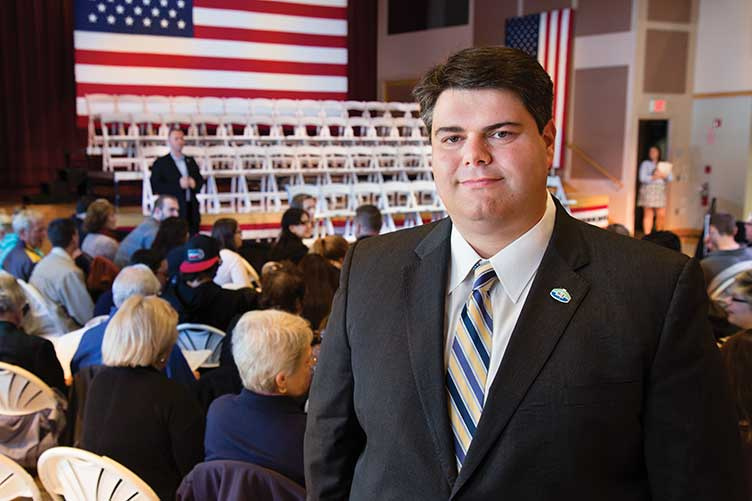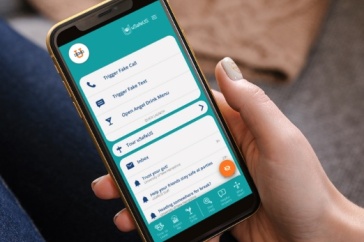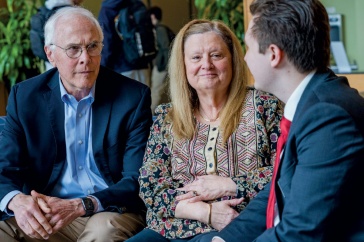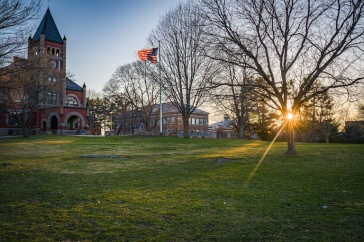
It was a few days before the 1992 presidential election, and Mike Vlacich ’95, a volunteer on Bill Clinton’s first campaign, needed $25 to rent a car. Vlacich and a friend planned to drive around the state the weekend before the election, pitching in where they could at field offices before returning to campus on Election Day. They were $10 short, and so Vlacich did what any enterprising campaign volunteer might do.
“I literally sold a shirt I had to a dormmate,” Vlacich says. “He liked the shirt a lot, so I said, ‘I’ll sell it to you for $10.’”
The shirt paid for a small sedan, which Vlacich and his friend dubbed the “Lincoln Clinton-ental,” and they went from town to town, stumping for Clinton during the day and sleeping in the car at night.
It was the start of a two-decades-and-counting career in campaigns and public service. In the years since, he’s helped Jeanne Shaheen and John Lynch ’74 win gubernatorial races in New Hampshire, and in 2014, he managed Shaheen’s U.S. Senate re-election bid against Scott Brown. Now, Vlacich’s career has come full circle: he’s once again working on a Clinton campaign, this time as the New Hampshire director for Hillary Clinton’s 2016 presidential bid.
And while the political landscape and the mechanics of campaigns have changed drastically over the last two decades, Vlacich’s approach has not. Campaigns are bigger and more expensive, but “one thing money can’t offset is the power of a neighbor talking to another neighbor about why they should support a candidate,” Vlacich says.
It’s an attitude that Vlacich has held since he was growing up in Concord. The son of working-class European immigrants, Vlacich and his brother were in tow when their parents went to meet candidates stumping in the city. On a chilly New Year’s Eve before the 1988 primary, Vlacich and his family stood in line to shake hands with then-vice-president George H.W. Bush. He heard then-president Ronald Reagan speak at a rally outside the New Hampshire State House, met former astronaut John Glenn during his 1984 presidential run, and saw countless candidates as they passed through Concord.
“It helped me understand that politics can and should be accessible. I never felt uncomfortable engaging in the political process, even though I grew up in a very middle class family with no political connections whatsoever,” he says.
This people-centered approach to politics served Vlacich well at Concord High School, where he worked with students from the nearby St. Paul’s School to organize rallies in support of a Martin Luther King Jr. holiday in the state. He kept up those efforts at UNH, where he majored in political science, served on the student senate and expanded his advocacy efforts to increasing state higher education funding.
“I was able to learn a lot about how you can have high ideas and desires, but you also have to organize to get where you want to be,” he says. After graduation, Vlacich worked on Bill Clinton’s 1996 re-election campaign and then transitioned to a job on Shaheen’s first bid for the governor’s office. She won the race and Vlacich transitioned from campaign staffer to constituent service worker. He took calls from people who were out of money and couldn’t pay their bills, or were trapped in an abusive situation and needed a way out, and connected them with someone who could help.
“It was the most important job I ever had,” Vlacich says. “We couldn’thelp everybody, but we wanted to make sure every person who called felt as if there was someone advocating for them and working their heart out for them.”
Vlacich shifted back into campaign mode in 2014, managing Shaheen’s re-election campaign, and began work on the Clinton campaign early
this spring.
In New Hampshire, “I’ve never thought any vote is a lock,” he says. “And even when you think you have someone locked in, you have to maintain that relationship with that voter and make sure you’re not taking it for granted.” It’s grueling work that Vlacich believes separates fair-weather candidates from politicians who get things done.
Conviction drives Vlacich’s political work, and he thinks Clinton can go the distance. It’s not a new position — about a month after he started volunteering for Bill Clinton’s campaign in the early 1990s, Hillary Clinton stopped at UNH for an event.
“She had an even bigger crowd than Bill Clinton (did a month earlier), and I remember being quoted in the student paper, saying ‘I think she’s the one who should be running for president,’” he says. Now, he’s helping to make it happen — no Lincoln Clinton-ental necessary.
Originally published in UNH Magazine—Fall 2015 Issue
-
Written By:
Larry Clow '12G | UNH Cooperative Extension
















































